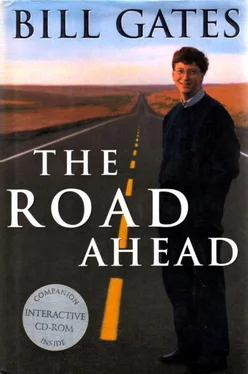You’ll know the information highway has become part of your life when you begin to resent it if information is not available via the network. One day you’ll be hunting for the repair manual for your bicycle and you’ll be annoyed that the manual is a paper document that you could misplace. You’ll wish it were an interactive electronic document, with animated illustrations and a video tutorial, always available on the network.
The network will draw us together, if that’s what we choose, or let us scatter ourselves into a million mediated communities. Above all, and in countless new ways, the information highway will give us choices that can put us in touch with entertainment, information, and each other.
I think Antoine de Saint-Exupéry, who wrote so eloquently about how people came to think of railroad locomotives and other forms of technology as friendly, would applaud the information highway and dismiss as backward-looking those who resist it. Fifty years ago he wrote: “Transport of the mails, transport of the human voice, transport of flickering pictures—in this century as in others our highest accomplishments still have the single aim of bringing men together. Do our dreamers hold that the invention of writing, of printing, of the sailing ship, degraded the human spirit?”
The information highway will lead to many destinations. I’ve enjoyed speculating about some of these. Doubtless I’ve made some foolish predictions, but I hope not too many. In any case, I’m excited to be on the journey.
The information highway will have a significant effect on all of our lives in the years to come. As I suggested in chapter 9, the greatest benefits will come from the application of technology to education—formal and informal. To help facilitate this in a small way, my portion of the proceeds from this book will go to support teachers who are incorporating computers into their classrooms. Through the National Foundation for the Improvement of Education in the United States and comparable organizations throughout the world, the funds will help teachers create opportunities for students—just as the Mothers’ Club at Lakeside made my first exploration of computers possible.
I’ve worked long hours on this book. I work hard because I love my work. It’s not an addiction, and I like doing a lot of other things, but I find my work very exciting. My focus is to keep Microsoft in the forefront through constant renewal. It’s a little scary that as computer technology has moved ahead there’s never been a leader from one era who was also a leader in the next. Microsoft has been a leader in the PC era. So from a historical perspective, I guess Microsoft is disqualified from leading in the highway era of the Information Age. But I want to defy historical tradition. Somewhere ahead is the threshold dividing the PC era from the highway era. I want to be among the first to cross over when the moment comes. I think the tendency for successful companies to fail to innovate is just that: a tendency. If you’re too focused on your current business, it’s hard to change and concentrate on innovating.
For me, a big part of the fun has always been to hire and work with smart people. I enjoy learning from them. Some of the smart people we’re hiring now are a lot younger than I am. I envy them for having grown up with better computers. They’re extraordinarily talented and will contribute new visions. If Microsoft can combine these visions with listening carefully to customers, we have a chance to continue to lead the way. We can certainly keep providing better and better software to make the PC a universally empowering tool. I often say I have the best job in the world, and I mean it.
I think this is a wonderful time to be alive. There have never been so many opportunities to do things that were impossible before. It’s also the best time ever to start new companies, advance sciences such as medicine that improve quality of life, and stay in touch with friends and relatives. It’s important that both the good and bad points of the technological advances be discussed broadly so that society as a whole, rather than just technologists, can guide its direction.
Now it’s back to you. I explained in the Foreword that I was writing this book to help get a dialogue started and to call attention to a number of the opportunities and issues that individuals, companies, and nations will face. My hope is that after reading this book you will share some of my optimism, and will join the discussion about how we should be shaping the future.











